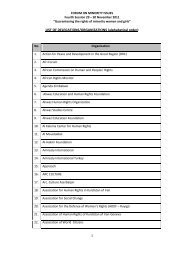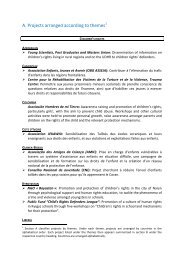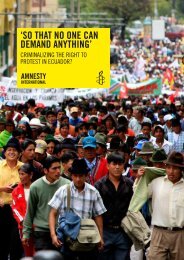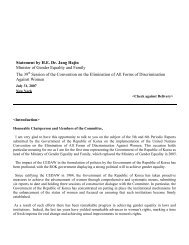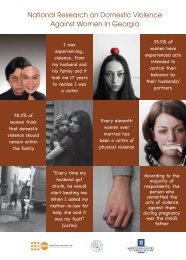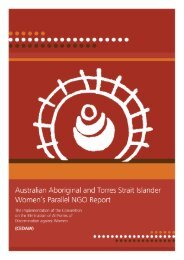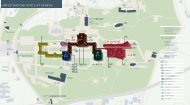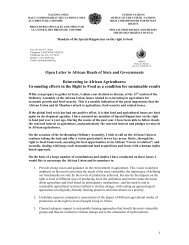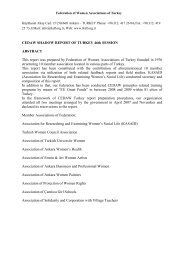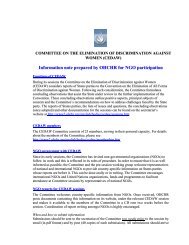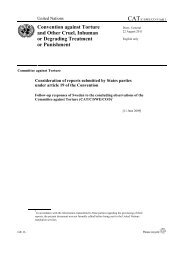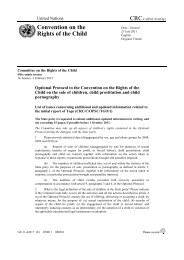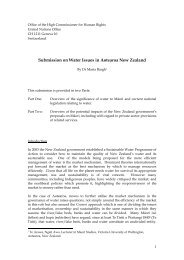Report - Office of the High Commissioner on Human Rights
Report - Office of the High Commissioner on Human Rights
Report - Office of the High Commissioner on Human Rights
- No tags were found...
Create successful ePaper yourself
Turn your PDF publications into a flip-book with our unique Google optimized e-Paper software.
The peace talks focused primarily <strong>on</strong> negotiati<strong>on</strong>s between <str<strong>on</strong>g>the</str<strong>on</strong>g> Papua New Guinea government and<br />
<str<strong>on</strong>g>the</str<strong>on</strong>g> armed groups. Women and <str<strong>on</strong>g>the</str<strong>on</strong>g>ir issues (e.g. dispossessi<strong>on</strong>, freedom <str<strong>on</strong>g>of</str<strong>on</strong>g> movement and land tenure)<br />
were largely neglected. While women play significant roles in Bougainville society, <str<strong>on</strong>g>the</str<strong>on</strong>g> reality is that<br />
<str<strong>on</strong>g>the</str<strong>on</strong>g>y are still coping with <str<strong>on</strong>g>the</str<strong>on</strong>g> trauma, stress and medical ailments from <str<strong>on</strong>g>the</str<strong>on</strong>g> c<strong>on</strong>flict. Their exclusi<strong>on</strong><br />
from <str<strong>on</strong>g>the</str<strong>on</strong>g> peace negotiati<strong>on</strong>s has meant that many <str<strong>on</strong>g>of</str<strong>on</strong>g> <str<strong>on</strong>g>the</str<strong>on</strong>g>ir land and tenure issues have not been<br />
adequately resolved.<br />
Recommendati<strong>on</strong> to States:<br />
• Government <str<strong>on</strong>g>of</str<strong>on</strong>g> Papua New Guinea to mandate <str<strong>on</strong>g>the</str<strong>on</strong>g> establishment <str<strong>on</strong>g>of</str<strong>on</strong>g> human rights projects and<br />
<str<strong>on</strong>g>of</str<strong>on</strong>g>fices in Bougainville.<br />
3.2 Intersecti<strong>on</strong>al Discriminati<strong>on</strong><br />
3.2.1 Discriminati<strong>on</strong> against indigenous and rural women<br />
Indigenous women in <str<strong>on</strong>g>the</str<strong>on</strong>g> Pacific are discriminated against in custom and law because <str<strong>on</strong>g>of</str<strong>on</strong>g> <str<strong>on</strong>g>the</str<strong>on</strong>g> low status<br />
and value attributed to women, especially to those who are poor and illiterate.<br />
“The Motu-Koita women have strict limitati<strong>on</strong>s <strong>on</strong> <str<strong>on</strong>g>the</str<strong>on</strong>g>ir rights and access to land. A Motu-<br />
Koita woman marrying outside <str<strong>on</strong>g>the</str<strong>on</strong>g> clan relinquishes her membership <str<strong>on</strong>g>of</str<strong>on</strong>g> <str<strong>on</strong>g>the</str<strong>on</strong>g> clan, unless she<br />
decides to live with her family in her original clan where she retains membership <str<strong>on</strong>g>of</str<strong>on</strong>g> <str<strong>on</strong>g>the</str<strong>on</strong>g> clan<br />
<strong>on</strong> terms and c<strong>on</strong>diti<strong>on</strong>s determined by custom. A woman who has married an outsider but<br />
is living in <str<strong>on</strong>g>the</str<strong>on</strong>g> clan may plant useful trees (such as coc<strong>on</strong>uts, betel nuts, mangoes, breadfruit<br />
etc.) <strong>on</strong> land allocated for her use but her descendents cannot use it as evidence <str<strong>on</strong>g>of</str<strong>on</strong>g> ownership.<br />
The trees are planted <strong>on</strong> <str<strong>on</strong>g>the</str<strong>on</strong>g> basis <str<strong>on</strong>g>of</str<strong>on</strong>g> permissive occupancy and descendents <str<strong>on</strong>g>of</str<strong>on</strong>g> <str<strong>on</strong>g>the</str<strong>on</strong>g> woman<br />
have access until <str<strong>on</strong>g>the</str<strong>on</strong>g> trees reach <str<strong>on</strong>g>the</str<strong>on</strong>g> end <str<strong>on</strong>g>of</str<strong>on</strong>g> <str<strong>on</strong>g>the</str<strong>on</strong>g>ir useful lives.<br />
My <strong>on</strong>ly daughter is married to an outsider and has had to apply for a piece <str<strong>on</strong>g>of</str<strong>on</strong>g> land and<br />
build her house to become part <str<strong>on</strong>g>of</str<strong>on</strong>g> <str<strong>on</strong>g>the</str<strong>on</strong>g> clan. She is in <str<strong>on</strong>g>the</str<strong>on</strong>g> positi<strong>on</strong> where she cannot<br />
access <str<strong>on</strong>g>the</str<strong>on</strong>g> land unless she gets approval from <str<strong>on</strong>g>the</str<strong>on</strong>g> clan chiefs. Only <str<strong>on</strong>g>the</str<strong>on</strong>g> chiefs and<br />
community leaders can participate in such decisi<strong>on</strong>-making. But because she has married<br />
an outsider, and he is unemployed, her family has a lower status and is discriminated<br />
against.” (Sose Tamarua, Papua New Guinea)<br />
Elements <str<strong>on</strong>g>of</str<strong>on</strong>g> <str<strong>on</strong>g>the</str<strong>on</strong>g> <strong>Human</strong><br />
Right to Adequate Housing<br />
Security <str<strong>on</strong>g>of</str<strong>on</strong>g> tenure and<br />
freedom from dispossessi<strong>on</strong><br />
Public goods and services<br />
Discriminati<strong>on</strong> experienced by indigenous and rural women<br />
• Customs discriminate against women’s rights to inheritance<br />
and access to land (Vanuatu);<br />
• Women are internally/externally alienated from <str<strong>on</strong>g>the</str<strong>on</strong>g>ir<br />
cultural right to land and housing (matrilineal systems);<br />
• Women are treated unequally in patrilineal and matrilineal<br />
systems.<br />
• Privatisati<strong>on</strong> is leading to increased costs and reduced<br />
access to public goods and services;<br />
• Lack <str<strong>on</strong>g>of</str<strong>on</strong>g> access to banks and financial services (for instance,<br />
<str<strong>on</strong>g>the</str<strong>on</strong>g>re is <strong>on</strong>ly <strong>on</strong>e bank in Bougainville). People, particularly<br />
women, have to depend <strong>on</strong> those who do have access,<br />
which creates social problems;<br />
26 WOMEN’S RIGHTS TO ADEQUATE HOUSEING AND LAND



